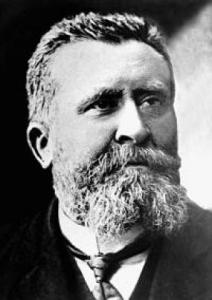 Jean Jaurès (1859-1914), member of the French National Assembly, leader of the Parti Socialiste Français and peace campaigner was an eloquent and compelling public speaker. One of his most famous speeches was his 1903 address to young people at the prize-giving at the lycée (senior high school) of Albi, where he himself had taught philosophy 20 years earlier from 1881 to 1883.
Jean Jaurès (1859-1914), member of the French National Assembly, leader of the Parti Socialiste Français and peace campaigner was an eloquent and compelling public speaker. One of his most famous speeches was his 1903 address to young people at the prize-giving at the lycée (senior high school) of Albi, where he himself had taught philosophy 20 years earlier from 1881 to 1883.
This speech is much more than a traditional ‘commencement address’ seeking to inspire and motivate its youthful audience on the cusp of adult life, although it certainly achieved that. As he later said: “how could I speak to these young people who are the future without sharing my own thoughts about that future?”
As a mature, experienced politician, both idealistic and pragmatic, Jaurès takes the opportunity to articulate his world view, starting with his commitment to the values of the 1789 revolution and his confidence in the potential of the republic to achieve social justice. He makes a strong case for peace and expresses his anticipation of a progressive liberation of humanity while reminding his audience that none of this will come about without concerted human activity. He appeals directly to young people to help realise the freedom and equality which are possible through courage and clear thinking.
Jaurès’ Discours à la Jeunesse fizzes with humanity and optimism; as fresh now as on the day it was delivered 113 years ago. The speech is full of contemporary relevance and merits to be read in its entirety. In this post I am quoting only from the final section, which offers a bold redefinition of ‘courage’ which still resonates today:
“The human race will be doomed if it is destined to kill forever. Courage today is not about keeping the dark cloud of war above the world; a terrible, though dormant, cloud which we delude ourselves will only burst over others. Courage is not about putting conflicts which reason can resolve into the hands of violence. Courage is about celebrating humanity not denying it.
For each of you, for each of your hours, courage will be about rising to the challenges of all sorts which you will encounter. Courage is not about handing over your free will to random forces or impressions, it is about keeping up the habit of work and action even in idle moments.
In the great chaos of life, courage is about choosing a job and doing it well, whatever it may be. It is about not flinching from the dreary details, it is about becoming an accomplished practitioner to the best of your ability. It is about understanding that the division of labour is a requirement of useful work while also keeping one eye on the wider world and taking a broader perspective. Courage is about being a worker and a philosopher all in one.
Courage is about understanding your own life, establishing, sharpening and deepening it while also co-ordinating it with the wider society. Courage is about making sure the thread in your loom doesn’t snap while also working for a greater and more fraternal social order where machines serve workers.
Courage is about acknowledging new developments in science and art, welcoming and exploring the almost infinite complexity of knowledge while clarifying the bewildering reality with a broad general understanding and organising and shaping it with the beauty of form and pattern.
Courage is about overcoming your faults, suffering for them but not being overwhelmed or side-tracked by them. Courage is about loving life and looking death in the eye, about aiming for the ideal and understanding the real, it’s about taking action and giving oneself to good causes unselfishly, without knowing what reward might follow.
Courage is about seeking truth and speaking truth, not about submitting to a great triumphant lie or echoing ignorant applause or fanatical jeers with our hearts, our mouths or our hands.
How poor would be our conception of life and how short our science of living if we believed that when war is abolished people will have fewer opportunities to demonstrate and experience courage or that we need to extend the military drum-rolls of the First Empire to quicken our hearts. They may have sounded heroic then, they would sound hollow now.
So, young people, you want your lives to be lived, honest and full. And that is why I have shared what I have with you in the way that I have.”
Jean Jaurès, Discours à la Jeunesse, 31st July 1903, Lycée d’Albi.
Extract translated by Eddie Playfair. Any mistranslations or clumsy phrases are mine.
See also:
Full text of the Discours à la Jeunesse in French.

Your recent posts have been inspiring.
LikeLike